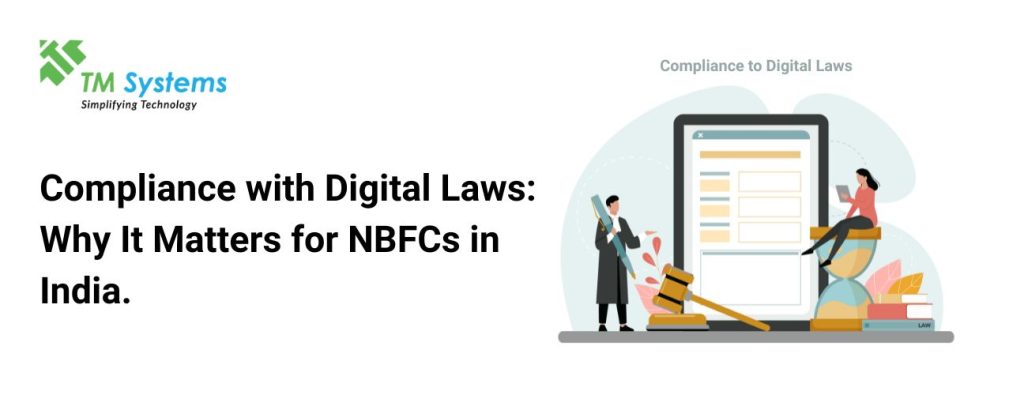
Compliance with Digital Laws: Why It Matters for NBFCs in India.

Compliance with Digital Laws: Why It Matters for NBFCs in India.
Introduction
Non-Banking Financial Companies (NBFCs) have become a critical pillar of India’s financial ecosystem, offering loans, asset financing, microfinance, and other services. But unlike traditional banks, NBFCs operate in a space that is both highly regulated and increasingly dependent on digital infrastructure.
As financial operations go digital, compliance is no longer limited to RBI guidelines and capital adequacy norms. Today, NBFCs must also comply with digital laws and cybersecurity regulations to protect sensitive customer data, ensure operational transparency, and avoid severe penalties.
In this blog, we explore how NBFCs can stay compliant with digital laws, the risks of non-compliance, and the steps they must take to safeguard both customers and operations.
The Digital Compliance Landscape for NBFCs
NBFCs are subject to multiple laws and regulations that govern their IT systems, data
handling, and cyber resilience:
- Information Technology (IT) Act, 2000
- Governs digital records, electronic signatures, and data protection.
- Mandates reasonable security practices for handling sensitive personal data.
- CERT-In Guidelines (2022)
- Requires reporting of cybersecurity incidents (such as phishing, ransomware, or data leaks) within 6 hours of detection / awareness.
- NBFCs must maintain audit trails of critical activities and ensure an incident response plan is in place.
- Data Protection Laws (DPDP Act, 2023)
- NBFCs (as Data Fiduciaries) must collect and process personal data only with clear consent or for legitimate uses permitted by law.
- Data Fiduciary Obligations: NBFCs must implement reasonable security safeguards to prevent personal data breaches and, in case of an incident, promptly report it to the Data Protection Board (DPB) as well as the affected individuals.
- Non-compliance can attract fines up to ₹250 crore per instance, depending on
severity and nature of the violation.
- RBI’s IT & Cybersecurity Framework for NBFCs
- Requires implementation of board-approved IT policies, periodic audits, and risk management systems.
- Focuses on data confidentiality, integrity, and availability.
Consequences of Non-Compliance
Non-compliance with digital laws doesn’t just lead to RBI fines, it can extend to:
- Monetary Penalties
- Breaches of the IT Act or DPDP Act can attract fines up to ₹250 crores.
- Failure to report a cyber incident under CERT-In can result in regulatory action.
- Operational Disruption
- Cyberattacks or regulatory bans can halt lending, collections, or digital payments.
- Reputational Damage
- Public disclosure of non-compliance can erode customer trust and investor confidence.
- Legal Liabilities
- Directors and officers can be held personally accountable for negligence in IT governance or data protection.
How NBFCs Can Stay Compliant
To safeguard both operations and customer trust, NBFCs must adopt a proactive compliance
strategy that blends technology with governance:
- Regular IT Audits: Identify gaps in systems, processes, and security controls before regulators do.
- Data Protection Frameworks: Implement encryption, access controls, and secure storage aligned with DPDP guidelines.
- Cybersecurity Monitoring: Deploy SIEM tools, intrusion detection, and endpoint security to catch threats early.
- Incident Response Planning: Maintain CERT-In compliant processes for detecting, reporting, and mitigating breaches.
- Employee Training: Build awareness around phishing, social engineering, and secure data handling.
- Vendor Risk Management: Ensure that third-party fintech or outsourcing partners also comply with digital laws.
For NBFCs, compliance has moved beyond balance sheets and RBI circulars and now extends into digital law, data protection, and cybersecurity governance. The cost of ignoring these obligations is not just regulatory penalties, but also business continuity, customer trust, and long-term survival.
At TM Systems, we help NBFCs navigate this complex regulatory landscape by aligning IT systems with compliance requirements. From cybersecurity audits to data protection frameworks and regulatory reporting support, our experts ensure that your business stays both compliant and resilient.
If you’re an NBFC looking to strengthen digital compliance, let’s connect.




